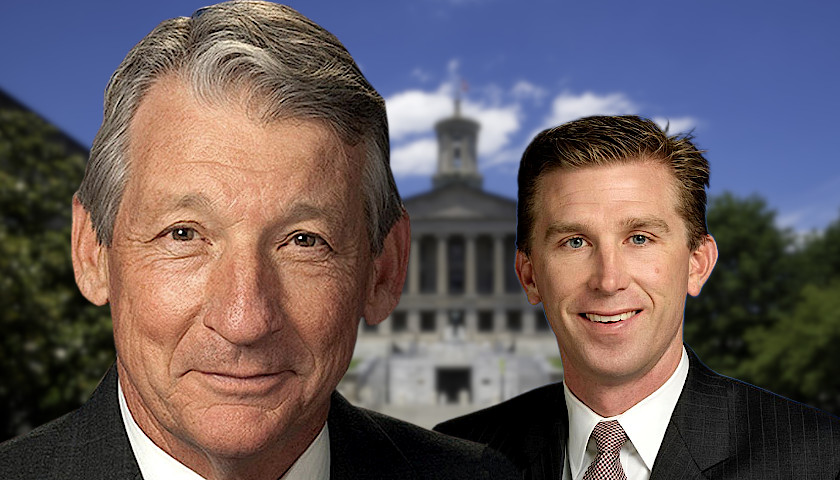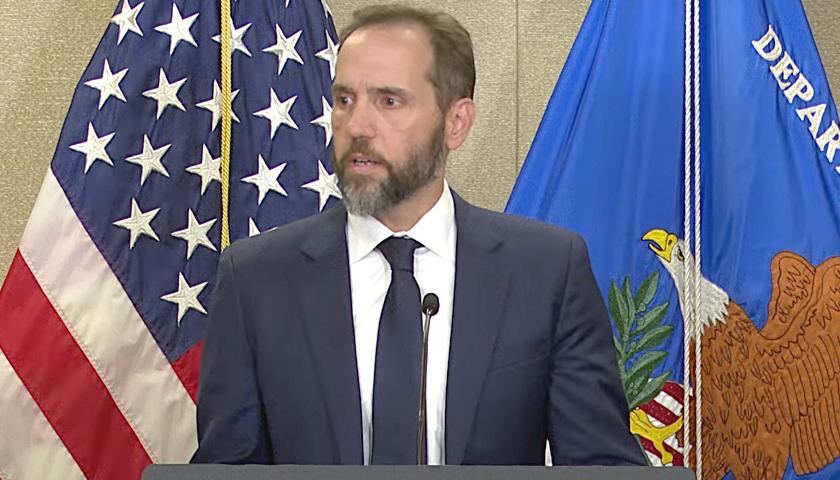A bill to be considered by the 111th Tennessee General Assembly will take a major step toward restoring the founding fathers’ intent for how U.S. senators would be elected in the state, which was circumvented by the 17th Amendment to the U.S. Constitution.
The bill, sponsored by Frank Niceley (R-Strawberry Plains) in the Senate and Ryan Williams (R-Cookeville) in the House, as SB 0027 and HB 0021, respectively, changes the nomination process for candidates for U. S. Senate.
As Senator Niceley explained when he presented a similar bill to the Senate State and Local Government Committee of the 110th Tennessee General Assembly, “Our founding fathers wanted the U.S. House of Representatives to be elected directly by the people. They wanted the U.S. Senate to be elected by the state legislatures. That’s why they called it the states’ house and the people’s house.”
Election by state legislatures is how U.S. Senators came into office for more than a century, until the passage of the 17th Amendment to the U.S. Constitution in 1913.
As Senator Niceley put it, the 17th Amendment to the U.S. Constitution passed in a wave of Progressivism.
Senator Niceley also made the point in his 2018 presentation of the similar bill, “In 1913 we got a rash of bad bills.” Elaborating on what he called a “very unlucky year for the American people,” Niceley recounted the other progressive advancements that year, “we got the Federal Reserve, the income tax and we also lost the way, changed the way, that the American people select their U.S Senators.”
Niceley is in good company with nationally-syndicated radio talk show host, Mark Levin, and New York Times bestseller author, who addresses the 17th Amendment in his book “The Liberty Amendments, Restoring the American Republic.”
Levin describes the 17th Amendment as “an object lesson in the malignancy of the Progressive mind-set and its destructive impact on the way we practice self-government in a twenty-first century, post-constitutional nation,” that was sold instead, as a “transformative expansion of popular democracy.”
Over the course of 10 chapters to restore the American republic, Levin recommends Amendments to the Constitution through an Article V Convention of States. The second of those recommendations, preceded only by an Amendment “to establish term limits for members of Congress,” is to “restore the Senate” by repealing the 17th Amendment.
“Like nearly every clause in the Constitution, the Framers intended that the nature and operation of the Senate serve several functions simultaneously.”
One of the four functions Levin describes which was subsequently eliminated through the 17th Amendment, “Providing the state governments with direct input in the national government was not only an essential check on the new federal government’s power, but also a means by which the states could influence congressional lawmaking, without stripping the federal government of its enumerated primacy over certain matters of governance.”
As Levin notes, the choice of U.S. Senators by state legislatures was adopted unanimously at the Constitutional Convention.
During the robust state ratification process, where “there were various points of trepidation” as Levin describes it, each was “aired fully and passionately,” yet “none of the amendments to the Constitution suggested by any of the state ratification conventions included the direct popular election of senators.”
Levin says that with the passage of the 17th Amendment, “The balance of power that had existed between the states and the federal government since the Constitution’s ratification was dealt a critical blow,” thus starting “the long silence of the states.”
As a result, Levin observes, U.S. Senators “now spend more time with, and are more beholden to, Washington lobbyists, campaign funders, national political consultants, and national advocacy organizations.”
Indeed, after a 2 to 1 vote by the House Republican caucus in 2013, great effort had been put forth by former State Representative Judd Matheny (R-Tullahoma) between the vote and 2015 to initiate a bilateral session between all Tennessee State House and Senate members meeting with the nine U.S. House members and two U.S. Senators in a public setting to discuss relevant issues facing all Tennesseans.
After Matheny organized the event to be held in February 2016, and invitations were sent from then Speaker of the House Beth Harwell, the bilateral session was cancelled due to a lack of response from the delegation, with the exception of Congressmen Scott DesJarlais, Steve Cohen and Phil Roe who were the only three of the 11 to respond.
The bill that Senator Niceley and Representative Williams propose would keep the general election in November in the hands of the people. What the law would change, if passed, is the way that the candidates for U.S. Senate would be nominated.
Currently, the nomination process is handled through a primary process at the August election. One candidate is selected for each of the recognized statewide political parties, currently being the Republican and Democrat parties.
The bill that Niceley and Williams have put forward would have candidates for the U.S. Senate seat be nominated by the members of their respective Republican or Democrat party of the Tennessee House of Representatives and Tennessee Senate during a joint caucus meeting.
Anyone nominated as a party candidate through this method and serves as a U.S. Senator for two consecutive terms would be ineligible for nomination at the next caucus, in effect applying term limits at the same time as changing the nominating process.
An unsuccessful candidate of the nominating process could not then run as an independent or write-in candidate as a work around.
Both Senator Niceley and Representative Williams told The Tennessee Star that no other state has implemented such a measure. Niceley imagined, what if just the 11 southern states adopted the same nomination process? The result would be that 22 U.S. Senators are nominated by and answerable to their state legislatures.
As Niceley put it, “If the States don’t get some control, we can’t go on.” He added, “This bill could change everything,” painting a much bigger picture, “It could save the world.”
National Constitution Center, on the 17th Amendment’s 105th anniversary in 2018, posed the question, “What would the Senate look like today without the 17th Amendment?”
The simple answer, “It would probably be much more controlled by the Republicans.”
National Constitution Center used data from the National Conference of State Legislatures as of February 2018, and found that “Republicans control 32 state legislatures, Democrats controlled 13 legislatures and 4 legislatures are split (Nebraska’s unicameral legislature is not included).”
“That would roughly translate to 64 seats for the GOP in the current Senate,” putting “Republicans four votes over a filibuster-proof 60-vote majority and within three seats of a 67-vote super-majority needed to override a presidential veto.”
While full repeal of the 17th Amendment would be the ideal fix, there are a number of factors that make repeal problematic. If the U.S. Congress agreed to repeal, or the repeal was an outcome of an Article V Convention of States, 38 states would have to ratify the repeal.
Additionally, as National Constitution Center points out, only one Amendment – the 18th – was repealed when the 21st Amendment ended Prohibition.
Still, the biggest obstacle to repeal, as pointed out by Mark Levin and National Constitution Center, is the idea that direct election gives the power to the people.
Both of the Tennessee bill sponsors separately asked, if direct election gives the power to the people, how is that working when it comes to U.S. Senators responding to Tennesseans?
As Williams told The Star, “What we’re doing now isn’t working.”
And, as Senator Niceley put it, rather than taking the vote away from the people, “We’re returning their Constitution to them by gaining back 90 percent of what we lost in 1913.”
If the Niceley/Williams bill passes, it would go into effect November 30, 2019, impacting the 2020 U.S. Senate nomination process.
– – –
Laura Baigert is a senior reporter with The Tennessee Star.
Photo “Frank Niceley (Left)” by Frank Niceley.
Photo “Ryan Williams (Right)” by Ryan Williams.






Well, it is good to see that a least a few people are paying attention AND are engaged. Several salient points are made by the commenters, even if some are slightly off the mark. Please allow me to interject…
The 17th Amendment DID circumvent the original intent of the “Founding Fathers”. During the ratification of the original Constitution, only one representative to the Convention voiced any concerns about the Senators being elected by the States. I believe that it was James Wilson of Pennsylvania. Everybody else liked the concept. In fact, although the Federalist papers and the Anti-Federalist papers recorded disagreements over many issues, there is not a single mention in either sets of documents which reference this as one of those issues.
Yes WJ Bryan might have been a well respected Democrat of the day, but he was a PROGRESSIVE! In fact, he was one of the early proponents of moving off of the gold standard! See how well that has worked!
The bottom line is that there are many reasons why the 17th Amendment gained traction and was ratified. However, the fact is that Woodrow Wilson Progressives used those emotional reasons and hood winked the American people into buying into the 16th and 17th Amendments! The 16th Amendment (Federal income tax) forever took away the financial leverage that the States had over the Federal government. And the 17th Amendment guaranteed that any control held by the States would be gone forever.
So we can argue about losing our “right” to vote for a US Senator, all we want. The fact is that I run into and interact with, my State legislators all the time, because they live here. When is the last time that you were able to interact with a sitting US Senator? If you do, it’s on their terms and at the time and place of their choosing. They live in DC and don’t give a rip about us citizens, except once every 6 years! And then, how easy is it to vote out an incumbent Senator. It don’t happen!
Not surprising to hear all of the progressive squeal protesting this proposal. The reason we have a bicameral legislature needs to be examined – there were a number of comments along the lines of “my Senator representing me” – that is not the design – the U.S Senator is there to represent the state’s interests, not the individual citizens of that state, except one step removed of course..
Your Congressional district representative is there to represent your individual interests. Also, this bill does nothing to the current process of electing your state representative and state senator – which is all by popular vote. That legislature, in turn, will select the U.S. Senatorial candidate for each of the recognized parties.
I am by NO means a ‘progressive’. I am a conservative Tennessean. I am FULLY capable of choosing the people for whom I vote to represent me in our government, and so are other Tennessee voters! This effort, if continued, will make the TENNESSEE TAX REVOLT look like nothing. I STRONGLY OBJECT TO HAVING MY RIGHT TO VOTE USURPED and STOLEN, WHETHER IT BE FOR MY SENATOR OR ANY OTHER LOCAL, STATE, OR FEDERAL OFFICE. Why should some group of people in Nashville be allowed to USURP my VOTING RIGHTS as provided by the 17th Amendment. I am FULLY capable of choosing the people for whom I vote, and so are other Tennessee voters. All this amounts to is just another POWER grab to steal away Tennesseans’ VOTING RIGHTS!!! This attempted voting right theft is a radical attack on the freedom of ALL Tennesseans. Neither Mr. Nicely nor Mr. Williams and their ilk, speak for me nor thousands and thousands of Tennesseans. Again, this effort, if continued, will make the TENNESSEE TAX REVOLT look like nothing.
This is ridiculous. The author of this incorrectly states that the 17th Amendment “circumvented” the Founders original plan. The LEGAL process to amend the Constitution was followed by the States and the 17th Amendment became law. Mr Nicely and Williams need to realize the many Tennesseans do NOT agree with taking away OUR VOTING RIGHTS to elect ALL of our representatives as provided by The Constitution of the United States’ 17th Amendment. IF TENNESSEANS DO NOT AGREE WITH AN ELECTED OFFICIAL, WE CAN VOTE THAT PERSON OUT OF OFFICE. Why should our state go back to FEWER citizens selecting our US Senators? At present, Tennessee VOTERS across DIRECTLY elect our representatives at the ballot box. Again, WHY should Tennesseans believe a FEW people in the State legislature will select someone who would be more “responsive” to Tennesseans or have more intelligence and foresight than the VOTERS across Tennessee? As Tennesseans, we do that for ourselves at the ballot box!!! Do Nicely and Williams think they are the “short list” to more political power that can’t be attained through the ballot box? Nicely and Williams have just resurfaced the NECESSITY of TERM LIMITS. If this comes to the floor of the state legislature for a vote, we may see more people who should be voted out along with Nicely and Williams.
“Our founding fathers wanted the U.S. House of Representatives to be elected directly by the people. They wanted the U.S. Senate to be elected by the state legislatures. That’s why they called it the states’ house and the people’s house.”
Yes, and that is why our State Constitution said the judges should be “elected by the qualified voters of the state”. Not the legislature. But that isn’t how TN Republicans interpreted it. They went along with the Democrats’ unconstitutional Tennessee Plan for several years, illegally appointing judges themselves, before introducing a constitutional amendment. I agree with Frank on this, but I don’t trust the TN legislation to select. They are power-hungry and took away the judicial branch from the people, losing a check and balance. Easier to corrupt a majority of the small state senate than 6 million people.
Jim is correct, Lack of TERM Limits is the problem. If the TN Governor has term limits of two and the US President have TERM Limit two what wrong with US Congress and the State House not having term Limits. Yes, Alexander and Corker overstayed their Welcome so have other elected officials including a bunch of Career Politicians now in the Tennessee State House. They too have also overstayed their Welcome, Is that right Representative Niceley I mean now Senator Niceley.
Horatio you are correct about the founding fathers intent was but back when they wrote the constitution it worked but after 125 years changes in culture, technology, a war between states corruption and big money gain control of the Senate. Ask yourself this if the founding father knew that abortion would be allow practice under constitution right do you think they would have put language in the constitution condoning such practice?
If you agree with Frank, Ask him how longer he intend to make a political career in the TN State House? FYI he served as the followed: House member of the 96th, 97th, 104th through 107th General Assemblies and now Senate member of the 108th through 111th General Assemblies
Mike, I don’t get your point with abortion. It is not in the constitution. It was “legalized” by judges, not the legislature as required by the constitution. Don’t need to ask Frank about his career in the House, he left some time ago. I agree with him on original intent of the constitution. He is also correct about 1913.
I would like to hear the discussion on this change from all parties. But I do agree, when we keep turning out Senators like Corker and Alexander from such a Conservative state something is fundamentally flawed with the current system. And let’s not forget Al Gore. Three powerful men who abused their position with impunity. And maybe then impeachment might be easier? Definitely very interested.
It is often said that those who failed to remember history are doom to repeat it. The question that these two Republican knuckleheads have failed to ask is what led to the 17th amendment. The answer is simple Americans did not directly vote for senators for the first 125 years of the Federal Government. The Constitution, as it was adopted in 1788, stated that senators would be elected by state legislatures. The first proposal to amend the Constitution to elect senators by popular vote was introduced in the U.S. House of Representatives in 1826, but the idea did not gain considerable support until the late 19th century when several problems related to Senate elections had become evident. Several state legislatures deadlocked over the election of senators, which led to Senate vacancies lasting months and even years. In other cases, political machines gained control over state legislatures, and the Senators elected with their support were dismissed as puppets. In addition, the senate was seen as a “millionaire’s club” serving powerful private interests. In short CORRUPTION became the problem with letting representatives choose representatives. I guess that proves the point “POWER tends to corrupt, and ABSOLUTE POWER CORRUPTS ABSOLUTELY”.
On April 8, 1913, three-quarters of the states had ratified the proposed 17th amendment.
What would happen if we returned to the original intent? According to the Constitutional Daily, “It’s the 105th anniversary of the 17th Amendment, leading us to consider what today’s U.S. Senate would look like if its members weren’t directly elected by voters.
The answer is simple: It would be probably be much more controlled by the Republicans, with a good chance that it could be a filibuster-proof majority and a chance it could be veto-proof.”
To have my Senator nominated by a bunch of talking heads (state senators and representatives) in Nashville in an insult to my Intelligence. It tells the people we can’t chose our nominee but here is our crony-for-the-day you can vote for. Not the mention you haven’t even address the issues of Discrimination (Race, Gender, Age, Disability…etc)
The problem in congress is not who elected their representatives but is the same problem we have in Tennessee Government lack of “TERM LIMITS” for the career politician.
This is a Constitutional Republic meaning it is “Government of the people, BY THE PEOPLE, for the people.” To tell me that you are going to choose my candidate, without primary vote, is in effect a form of “Socialism”. Where the definition of socialism is a political and economic theory of social organization which advocates that the means of production, distribution, and exchange should be owned or regulated by the community as a whole. In this case the State House becomes the community.
I find this ironic that the Tennessee Legislature would attempt to repudiate the 17th amendment to the Constitution that mandates popular election of U.S. Senators. Some of the earliest proponents of popular Senator elections includes many persons who enjoyed immense popularity in the Southeastern U.S. during the early 20th century such as William Jennings Bryan. Tennessee was one of 41 states that voted to ratify the 17th amendment. Many legislatures at that time were under the corrupt influence of wealthy special interest groups that could rig votes. This led to the backlash against the old practice of pushing for the 17th amendment as a remedy to this injustice. Today, the Tennessee Legislature suffers from this same corruption at the hands of corporate lobbyists and right-wing extremists.
One other question for the Tennessee Legislature: suppose you pass this bill to nullify the 17th amendment in Tennessee on the assumption that Republicans will retain control of both the Legislature and Governor’s mansion for a long time to come, but something happens to enable either the Democrats or another opposition to unexpectedly gain control of the state legislative and executive branches? You would become the sudden victim instead of the beneficiary of such a bill. Right now, it appears quite likely that the G.O.P. will retain this control, but history has a practice of being unpredictable about the future. If the Republicans should unwittingly pursue policies that cause a major economic or social crisis for the entire electorate, both black and white, both male and female, both socially orthodox and non-conformists, you could have a major anti-conservative backlash if the opposition knows how to organize itself and pin the crisis in the minds of an otherwise predominantly conservative electorate on the incumbent conservative Republicans in power.
My advice to the Tea Party: don’t be so smug!
The SEC overwhelmingly passed the resolution
To have closed primarys in our state . The house and senate then must put forth a bill and vote on this to become law . Senator Briggs and Bill Dunn both refused to carry or support this action ! Kinda tells you something doesn’t. It ?
Yes, but not what you are thinking. The “primaries” are not constitutionally required elections and are nothing more than a couple (R & D) of private political parties using public funded facilities and voting machines for their private, in-club elections to determine their nominees for the actual, constitutionally-required general election. This is why they cannot be “closed” like the TNGOP wants. They take public money and equipment for their “private” primaries. The TNGOP need to take their ball and go home. Stop using public funding and you can have whatever kind of primary you want. It seems to work for every other party out there except the Big Two. They want a free ride.